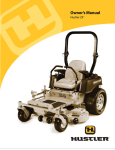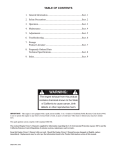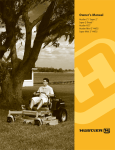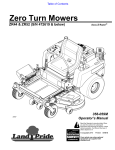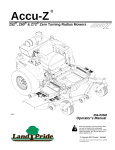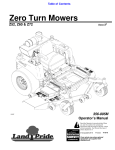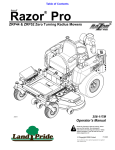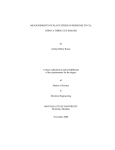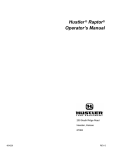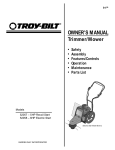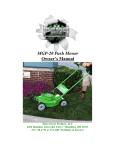Download Hustler Turf 60"/72" Out Front Deck 3500/3700 User's Manual
Transcript
Hustler 3500/3700 60”/72” Out Front Deck Owner’s Manual ••••• P.O. Box 7000 ••• Hesston, Kansas • 67062-2097 109631_0908 109631_0908 GENERAL INFORMATION Warranty registration This manual applies to the following Hustler equipment lines: The completed Warranty Registration and Delivery form must be sent to Hustler Turf Equipment within ten (10) days of delivery to validate your warranty protection. As the new equipment owner, you are expected to see that the form is completed and forwarded to Hustler Turf Equipment at time of delivery. The warranty registration form can also be accomplished electronically by the Hustler Dealer to validate the warranty. This form must be on file for validation before any warranty claim applications can be processed by Hustler Turf Equipment. Be sure to register the tractor plus each attachment that displays a model and serial identification number plate with Hustler Turf Equipment. IMPORTANT: Any unauthorized modification, alteration, or use of non-approved attachments voids the warranty and releases Hustler Turf Equipment from any liability arising from subsequent use of this equipment. Hustler Front Mount Deck 60” Hustler Front Mount Deck 72” To the new owner The purpose of this manual is to assist owners and operators in maintaining and operating the Hustler Front Mount Decks. Please read it carefully; information and instructions furnished can help you achieve years of dependable performance. It is the owner’s responsibility to make certain that the operators and mechanics read and understand this manual and all decals before operating this machine. It is also the owner’s responsibility to make certain that the operators and mechanics are qualified and physically able individuals, properly trained in the operation of this equipment. All operator and mechanics must become familiar with the safe operation of the equipment, operator controls and safety signs. IMPORTANT: For more detailed maintenance and adjustment information refer to the proper parts manual for your machine. The owner/user can prevent and is responsible for accidents or injuries occurring to themselves, other people or property. Model and serial number Model and serial numbers are found on the serial identification plate, located on the left rear top of the deck. These numbers are required on the Warranty Registration form. They will also assure you of the correct service parts when replacement becomes necessary. Using this manual Parts and service General operation, adjustment and maintenance guidance is outlined for both the experienced and novice Hustler user. Operating conditions vary considerably and cannot all be addressed individually. Through experience, however, operators should find no difficulty in developing good operating skills suitable to most conditions. Directions used in this manual, for example RIGHT or LEFT, refer to directions when seated on tractor facing forward, unless otherwise stated. Photographs and illustrations used were current at the time of printing, but subsequent production changes may cause your machine to vary slightly in detail. Hustler Turf Equipment reserves the right to redesign and change the machine as deemed necessary, without notification. If a change has been made to your machine which is not reflected in this owner’s manual, or the parts manual, see your Hustler dealer for current information and parts. Use original Hustler replacement parts only. These parts are available through your local Hustler dealer. To obtain prompt, efficient service, always provide the following information when ordering parts: 1. Correct part description 2. Correct model number. 3. Correct serial number. All warranty repair and service must be handled through an authorized Hustler dealer. Arrangements should be made through your local service center. 109631_0908 1-1 1-2 109631_0908 HUSTLER FRONT MOUNT DECKS TWO YEAR LIMITED WARRANTY FOR DECK (THREE YEAR LIMITED WARRANTY ON DECK SPINDLE BEARING & DECK GAUGE FORK BEARING) ● Damage caused by use of the Hustler Turf Equipment for purposes other than those for which it was designed ● Damages caused by disasters such as fire, flood, wind, and lightening ● Damages caused by foam filled or solid filled tires. ● Damages caused by neglect, abuse, abnormal use, improper or unreasonable use, accident, negligence or misuse ● Repairs or replacement resulting from the use of unauthorized parts, accessories or attachments ● Repairs or replacement as the result if any alterations or modifications, in the determination of Hustler Turf Equipment, which adversely affects the operation, performance or durability of the equipment. ● Hustler Turf Equipment which has the serial number removed or made illegible ● Depreciation or damage caused by normal wear, lack of reasonable and proper maintenance, failure to follow the product’s owner’s manual operating, maintenance and adjustment instructions or other operational instructions provided by Hustler Turf Equipment. ● Normal maintenance parts and service including, but not limited to, lubricants, belts, blades, blade sharpening, bearings WHAT IS COVERED BY THIS WARRANTY Hustler Turf Equipment, makes the following warranty to the original purchaser only: a. First and Second Year: Hustler Turf Equipment Tractors and Power Units are warranted for two (2) years from date of delivery on all materials and workmanship. If the Purchaser discovers within this warranty period a defect in materials or workmanship: ● He must promptly notify Hustler Turf Equipment, or an authorized dealer, in writing of the defect. In no event shall such notification be received by Hustler Turf Equipment, or an authorized dealer later than twenty-five (25) months from date of delivery. ● Within a reasonable time after such notification, Hustler Turf Equipment, will correct any defect in material or workmanship on the Hustler Turf Equipment, by repairing or replacing part(s) with either new or used replacement parts. ● Such repair, including parts and labor shall be at the expense of Hustler Turf Equipment, and, b. Third Year: At the conclusion of the two year limited warranty described in paragraph (a) above, there shall be an additional one year limited warranty on deck gauge fork bearings and deck spindle bearings only, no labor. If the Purchaser discovers within this warranty period a defect in either of these bearings: ● He must promptly notify Hustler Turf Equipment, or an authorized dealer, in writing of the defect. In no event shall such notification be received by Hustler Turf Equipment, or an authorized dealer later than thirty-seven (37) months from date of delivery. ● Within a reasonable time after such notification, Hustler Turf Equipment, will provide new replacement bearing to install on the Hustler Turf Equipment. ● The installation of the deck gauge fork bearing and deck spindle bearing shall be at the expense of the owner, and, c. Rental Units (90 days): Within 90 days of date of delivery Hustler Turf Equipment, provides a limited warranty on all materials and workmanship for units used for rental purposes. If the Purchaser discovers within this warranty period a defect in materials or workmanship: ● He must promptly notify Hustler Turf Equipment, or an authorized dealer, in writing of the defect. In no event shall such notification be received by Hustler Turf Equipment, or an authorized dealer later than 120 days from date of delivery. ● Within a reasonable time after such notification, Hustler Turf Equipment, will correct any defect in material or workmanship on the Hustler Turf Equipment, by repairing or replacing part(s) with either new or used replacement parts. ● Such repair, including parts and labor shall be at the expense of Hustler Turf Equipment, and, DISCLAIMER OF WARRANTY The foregoing warranties are in lieu of all other warranties, expressed or implied, including but not limited to the implied warranties of merchantability and fitness for a particular purpose. However, if the Hustler Turf Equipment is purchased as a consumer product, any implied warranty of merchantability or fitness for a particular purpose is limited to the duration of this limited warranty. Some states do not allow limitations on how long an implied warranty lasts, so the above limitation may not apply to you. This warranty gives you specific legal rights, and you may also have other rights which vary from state to state. LIMITATION OF REMEDIES In no case shall Hustler Turf Equipment, be liable for any special, incidental, or consequential damages based upon breach of warranty, breach of contract, negligence, strict liability in tort, or any other legal theory. Such damages include, but are not limited to: ● Loss of profits ● Loss of savings or revenue ● Loss of use of Hustler Turf Equipment or any associated equipment ● Cost of capital ● Cost of any substitute equipment, facilities, services or downtime ● The claims of third parties including customers, and injury to property Some states do not allow the exclusion or limitation of incidental or consequential damages, so the above limitation or exclusion may not apply to you. TIME LIMIT Any action for breach of warranty must be commenced within twenty-five (25) months following delivery of the goods in a non-rental application. Any action for breach of warranty must be commenced within 120 days following delivery of the goods in a rental application. WHO MUST PERFORM THE WARRANTY SERVICE All warranty service will be performed by dealers authorized by Hustler Turf Equipment. Service calls and/or transportation expense of the product to and from the authorized dealer, for warranty work, will be paid by the owner of the product. For warranty service you can contact an authorized dealer or write Hustler Turf Equipment, 200 South Ridge Road, Hesston, Kansas 67062, or call 1-620-327-4911. NO OTHER WARRANTIES Unless modified in writing, signed by both parties, and approved by the President of Hustler Turf Equipment, this agreement is understood to be the complete and exclusive agreement between the parties, superseding all prior agreements, oral or written, and all other communications between the parties relating to the subject matter of this agreement. No employee of Hustler Turf Equipment, or any other party is authorized to make any warranty in addition to those made in this agreement. WHAT IS NOT COVERED BY THIS WARRANTY Hustler Turf Equipment, does not warranty: ● Some product, components or parts not manufactured by Hustler Turf Equipment ● Repairs made by unauthorized persons 109631_0908 1-3 ALLOCATION OF RISKS This agreement allocates the risks of product failure between Hustler Turf Equipment, and the purchaser. This allocation is recognized by both parties and is reflected in the price of the goods. OWNER'S RESPONSIBILITY You must maintain your Hustler Turf Equipment product following the maintenance procedures described in your owner's manual. Such routine maintenance, whether performed by a dealer or by you, is at your expense. This machine like any other powered equipment is potentially dangerous unless properly operated. Any operator must be cautious and keep safety in mind at all times. Any operator, prior to using the Hustler Turf Equipment, should thoroughly familiarize himself with the owner's manual regarding operation and safety of the machine, as well as all safety warnings on the machine itself. WARRANTY REGISTRATION 1. Dealers must register the unit on-line at www.Hustler dealer.com or by filling out the Warranty registration form, provided in the owner’s packet. If using the Warranty registration form it MUST be completed and signed by the authorized dealer and original purchaser. 2. For validation, the completed Warranty registration form MUST be forwarded to Hustler Turf Equipment, within ten (10) days following date of purchase. 3. The date of purchase constitutes delivery. 1-4 109631_0908 SAFETY PRECAUTIONS It is the owner’s responsibility to make certain that the operators and mechanics read and understand this manual and all decals before operating this machine. It is also the owner’s responsibility to make certain that the operators and mechanics are qualified and physically able individuals, properly trained in the operation of this equipment. All operator and mechanics must become familiar with the safe operation of the equipment, operator controls and safety signs. Never let children or untrained people operate or service the equipment. Local regulations may restrict the age of the operator. IMPORTANT: For more detailed maintenance and adjustment information refer to the proper parts manual for your machine. The owner/user can prevent and is responsible for accidents or injuries occurring to themselves, other people or property. The owner should also ensure that the operator/mechanic know that they are responsible for their own safety as well as the safety of other persons within the vicinity. Remember, the operator is responsible for accidents or hazards occurring to other people or their property. This safety alert symbol is used to call attention to a message intended to provide a reasonable degree of PERSONAL SAFETY for operators and other persons during the normal operation and servicing of this equipment. Obey all safety messages that follow this symbol to avoid possible injury or death. DANGER – denotes immediate hazards which WILL result in severe personal injury or death. WARNING – denotes a hazard or unsafe practice which COULD result in severe personal injury or death. This manual uses two other words to highlight information. IMPORTANT calls attention to special mechanical information and NOTE: emphasizes general information worthy of special attention. All operators and mechanics should read this manual, and be instructed about safe operating and maintenance procedures. If the operators or mechanics cannot read and understand English, it is the owner’s responsibility to explain this material to them. Incorrect usage of this machine may result in severe injury. Personnel operating and maintaining it should be trained in the proper use and should read the manuals completely and thoroughly before attempting to set-up, operate, adjust, or service this machine. 109631_0708 2-1 Safety and Instruction Decals V Specific safety warning decals are located on the equipment near the immediate areas of potential hazards. These decals should not be removed or obliterated. Replace them if they become non-readable. The following illustrations show the various decals that are located on the machine. A brief explanation, for those requiring one, is shown to help the operator understand the meanings of these decals. WARNING: Rotating driveshaft! WARNING: Read Owner’s Manual before attempting to operate or service this machine. Part Number 601623 Part Number 601625 601623 • Keep hands, feet and clothing clear of this area. • Keep a safe distance from the machine. • Keep shields or covers in place while machine is in operation. Wear ear protection, eye protection and safety shoes when operating this equipment. Part Number 601624 601624 WARNING: Thrown objects WARNING: Thrown objects • Never operate the mower deck with side deflector damaged, altered, removed or in raised position, except when the entire grass catcher attachment or mulching system is being used. DANGER Rotating blades, pulleys & belts Part Number 601603 Part Number 601603 • Always maintain a safe distance from people and pets when mowing. • Always stop machine if someone enters the area. 2-2 • Keep hands, feet and clothing away. • Keep shields or covers in place while machine is in operation. 109631_0708 OPERATION V Always be alert for hazards such as rocks, metal objects and other debris which may be thrown or entangled by mower blades. Watch out for holes or deep depressions. V Inspect area to be mowed for hazards such as rocks, metal objects and other debris which may be thrown or entangled by mower blades. Remove these objects before mowing. V Always keep clear of the mower blades and attachments during their operation. V Always maintain a safe distance from people and pets when mowing. Always stop machine if someone enters the area. V Never attempt high speed maneuvering in crowded or congested areas V Turn off blades when not mowing. V Never raise the mower deck with the blades engaged to avoid small obstacles, drive over curbs and so forth. Disengage the pto clutch before raising the deck. V Stop the engine before removing the grass catcher or unclogging the discharge chute. Never clear the discharge chute with the engine running. Turn off the engine and be sure the blades have stopped before cleaning. Use a stick to clear a plugged discharge area. Never use your hand! V Follow the manufacturer’s recommendation for wheel weights or counterweights. V Never attempt to back machine onto transport trailer with mower deck or attachment in the raised position. V Clean flammable material from machine. Prevent fires by keeping the mower deck clean of accumulated trash, grass clippings, and other debris. Safe Operating Practices This product is capable of amputating hands and feet and throwing objects. Always follow all safety instructions to avoid serious injury or death. Operation V Always keep safety shields and covers in place, except for servicing. V Follow daily and weekly checklists, making sure hoses are tightly secured and bolts are tightened. V Always inspect machine for damage after striking a foreign object. If damage is found, repair machine immediately. Be sure to stop on level ground, place park brake lever in the brake engaged position, place the PTO lever in the “OFF” position, lower attachment, remove ignition switch key before leaving operator’s seat to inspect damage. V Never turn the PTO switch on unless the PTO shaft is securely connected to a power driven attachment. V Never operate a poorly maintained machine. V Always operate machine in daylight or with adequate workinglights. V Never put hands or feet under any part of the machine while it is running. V Never direct discharged material toward anyone. Avoid discharging material against a wall or obstruction. Material may ricochet back toward the operator. Always disengage the blades and wait for them to stop before crossing gravel drives, walks or roads. 1. 2. 3. 4. Gauge wheel assemblies Discharge chute Gearbox Front height adjustment 5. 6. 7. 8. 9. Fig. 3-1 109631_0908 3-1 Deck carrier arm PTO shaft Rear height adjustment Anti-scalp wheels Locking pin Attaching mower deck to tractor To attach the Front Mount Mower Deck to a tractor, follow these recommended steps: 1. Insert the woodruff key into the keyway on the gearbox’s input shaft. Align the woodruff key with keyway on universal joint of PTO shaft. Coat the gearbox input shaft with NEVER-SEEZ compound. Slide universal joint onto gearbox shaft. Secure PTO shaft to gearbox shaft with 5/16” cap screw, flat washer, and 5/16” nut provided. Fig. 3-2 and 3-3 2. Lower tractor tool bar. 3. Block rear of mower deck up so that the deck carrier arms are at the same height as the tractor tool bar. 4. Drive the tractor ahead slowly and insert mower deck carrier arms into the tractor tool bar. Stop tractor engine, engage park brake and remove key from the igniton switch. Fig. 3-4 Clevis pin WARNING: Stop engine. Make sure PTO switch is off. Engage park brake and remove ignition key before getting off machine. Carrier arm Tool bar Hair pin 5. By moving the mower deck, align the holes in deck carrier arms and tractor tool bar. 6. Insert tractor clevis pins through holes in tool bar and carrier arms and lock clevis pins in place using hair pins provided. Fig. 3-4 7. Attach the PTO shaft to the engine shaft. Fig. 3-5 NOTE: Never attach the PTO shaft to the engine shaft without it being attached to the mower deck gearbox. 8. The mower deck is now ready for the deck leveling procedure. To remove deck from tractor, reverse above procedure. Fig. 3-4 Brake pedal Reverse travel pedal Engine shaft Leveling mower deck NOTE: Levelness of mower deck when lifted from surface does not affect levelness of cut in mowing position. Mower deck will mow (cut) level if it is level when set on level surface. Forward travel pedal PTO shaft HST foot pedals Woodruff key Fig. 3-5 Refer to tractor owner’s manual for correct tractor tire pressure. To level mower deck use the following procedure: 1. Park the unit on a flat surface and set the park brake. Shut off tractor engine and remove key from the igniton switch. WARNING: Stop engine. Remove ignition key before getting off machine. Input shaft 2. Check the deck’s tire pressure and adjust it accordingly. Tire pressure should be 8-12 psi (55-83 KPa). 3. Set the 3500/3700 tractor’s Tool Bar Lift Control Lever in the fully forward position. (Refer to tractor’s owner’s manual for complete information.) 4. Rotate the 3500/3700 tractor’s Weight Control Valve knob counterclockwise as far as it will turn to achieve the minimum weight transfer setting. (Refer to tractor’s owner’s manual for complete information.) 5. Set the deck cutting height to 3.5” at the two front gauge wheel forks and at the two rear height adjusting linkages. (Refer to Cutting Height Adjustment section to set cutting height.) 6. Measure from the level surface to the top of the deck. Fig. 3-6 The top of the deck is 5.09” higher than the actual cutting height. Take the measurements at each of the areas shown (Fig. 3-6) and subtract 5.09” from them. That will give the actual cutting height for that location. Example: 8.59” (top of deck height) -5.09” (top of deck to blade distance) 3.50” (cutting height) Fig. 3-2 5/16” cap screw Flat washer 5-16” nut Universal joint Fig. 3-3 NOTE: The rear of the deck should be .2” - .5” higher than the front of the deck. 3-2 109631_0908 7. If the measured cutting height is significantly different than the 3.5” desired height than the front of the deck will have to be adjusted at the two front gauge wheel forks. The rear of the deck will have to be adjusted by moving the pins up or down in the adjusting holes. Refer to Cutting hieght adjustment section for more detailed information. NOTE: Minor leveling can be accomplished by moving the 1/2” cap screw on either front gauge arm mount forward in the slot, to raise cutting height, or backwards to lower cutting height. Fig. 3-7 8. If one side of the deck is more than .25” higher than the other side, lower the high side of the deck by transferring the .25” gauge wheel spacer from under the gauge wheel fork bearing to the top side. (Fig. 3-8 and 311) Lower the rear of the deck .25” at the rear height adjustment pin one hole. Fig. 3-9 and 3-13 9. The mower deck should now be level. .25” Spacer Cutting height adjustment Fig. 3-8 WARNING: Make sure PTO clutch switch is off, engage tractor parking brake, stop engine, and remove ignition key before making any adjustments to mower deck. Rear height adjustment anchor Rear height shown set at 2.5” For best results, make cutting height adjustments on a hard flat surface. The mower deck can be height adjusted in back as well as in front. Measure to top of deck here Measure to top of deck here Clevis pin Rear height adjusting yoke Fig. 3-9 The mower deck has two different cutting height range settings: 2” – 6” or 1” – 5”. The deck is preset at the factory to the 2” – 6” setting. Both front and rear height adjustment are in 1/4” increments. For a quick check of height adjustments: Measure from level surface to top of mower deck (as indicated in Fig. 3-7) and subtract 5.09 inches. The balance will be blade height. To be sure mower deck is level, measure at front and back on both left and right side of deck. Fig. 3-6 Measure to top of deck here Measure to top of deck here To adjust front cutting height 1. Park the unit on a flat surface, set the park brake and using the tractor’s hydraulic system lift mower deck off the ground. Shut off tractor engine. Place 8” tall blocks at the four corners of the deck. Restart engine and lower the deck onto the blocks. Shut off tractor engine and remove key from the igniton switch. Fig. 3-6 When mower deck is set in the 2” – 6” range. Recesses on gauge arm mount 2.5” 3.5” 4.5” Gauge wheel assembly 5.5” 2” 3” WARNING: Stop engine. Remove ignition key before getting off machine. 4” 5” 6” WARNING: The deck must rest on the blocks to prevent the deck from being lowered suddenly by the accidental movement of the tractor’s tool bar lift control lever. 2. Pull up and forward on gauge wheel handle and lift or lower wheel to desired height (Fig. 3-10). Both gauge wheels should be adjusted to same height for uniform cutting. Loosen cap screw for adjustments of less than 1/4” NOTE: To change cutting height range setting to the 1” – 5” range, reposition the two .5” spacers, located below the gauge wheel bearings, to above the bearings. Fig. 3-11 & Fig. 3-12 NOTE: 2” – 6” cutting height range: Recesses on side of gauge arm mounts visually indicate cutting height in 1/2” increments. Each notch between recesses represents a 1/4” adjustment. When the bottom (lowest) recess is just visible over top of gauge wheel assembly, cutting height is set at 6”, when the mower deck is set in the 2” – 6” range (see Fig. 3-7). Next mark up indicates 5-1/2”, then 5” and so forth. Top mark indicates 2”. Move gauge wheel assemblies all the way to top of arms for 2” cutting height. Gauge arm mount Measure, then subtract 5.09” Fig. 3-7 109631_0908 3-3 Handle .25” Spacer .5” Spacers Gauge wheel fork Fig. 3-11 Fig. 3-10 NOTE: 1” – 5” cutting height range: Recesses on side of gauge arm mounts visually indicate cutting height in 1/2” increments. When the bottom (lowest) recess is just visible over top of gauge wheel assembly, cutting height is set at 5”, when the mower deck is set in the 1” – 5” range. Next mark up indicates 4-1/2”, then 4” and so forth. Top mark indicates 1”. Move gauge wheel assemblies all the way to top of arms for 1” cutting height. If gauge wheels do not remain securely in place when handles are in closed (down) position, follow procedures outlined in Gauge Wheel Tension Adjustment section of this manual. .5” Spacers To adjust rear cutting height 1. Park the unit on a flat surface, set the park brake and using the tractor’s hydraulic system lift mower deck off the ground. Shut off tractor engine and remove key from the igniton switch. Place 8” tall blocks under the rear of the deck. NOTE: The deck must be in the raised position to release pressure from the lift chains Fig. 3-12 the deck pitch (angle from front to back of deck) being decreased. Additional cutting height adjustments may be necessary if the Weight Control feature is used consistently. Anti-scalp rollers WARNING: Stop engine. Remove ignition key before getting off machine. Anti-scalp rollers are standard on Hustler Front Mount mower decks. These anti-scalp rollers are designed to minimize scalping when mowing on rough uneven terrain. Fig. 3-1 After setting the cutting height, adjust the front anti-scalp roller so it extends below the mower deck but does not contact the ground. It can be set at either 3/4” or 1-3/4” 19.05mm to 44.45mm) below the cutting height. Fig. 3-14 The rear anti-scalp roller is not adjustable. WARNING: Placing the blocks under the rear of the deck will help prevent injury in the event the deck is lowered suddenly by the accidental movement of the tractor’s tool bar lift control lever. 2. Remove the clevis pin from the rear height adjusting yoke. Locate the appropriate hole in the yoke and in the rear height adjustment anchor and insert the clevis pin through both and secure in place. Fig. 3-9 & Fig. 313 NOTE: Adjust the rear of the mower deck to match the front cutting height setting. 3. Set the opposite side rear height adjustment using procedures in preceding steps. Mowing suggestions The following list is not all inclusive. Additional suggestions can be found in operation section of tractor manual. 1. Keep blades sharp. Many professional mowing companies have additional sets of blades and change blades twice a day: once in the morning and again at noon. Many problems with incorrect cutting patterns are due to dull blades or blades which have been sharpened incorrectly. Information on sharpening blades is listed in this manual’s maintenance section. In addition, most communities have individuals or companies which specialize in sharpening mower blades. Blade sharpness should be checked daily. IMPORTANT: Deck cutting height will be affected by the use of the 3500/ 3700 tractor’s Weight Control Valve. This allows the operator to transfer weight from the front gauge wheels to the front drive wheels to increase traction. Using this feature will result in the cutting height being increased and 3-4 109631_0908 Front anti-scalp wheel +.75” Rear height +.50” adjustment anchor +.25” +0” Mount hole Fig. 3-14 6” 5” 4” 3” 2” throwing grass discharge onto unmowed area because grass is then mowed “twice”. Mowing twice puts an unnecessary load on tractor and reduces mowing efficiency. 4. Avoid sudden turns on wet turf. These can damage turf unnecessarily. 5. Never raise the mower deck with the blades engaged to avoid small obstacles, drive over curbs and so forth. Disengage the PTO before raising the deck, using the tractor’s tool bar lift control lever. See tractor owner’s manual for additional information. 6. Always check area to be mown for rocks and other debris before mowing and remove them from operator’s path. 1” Fig. 3-13 2. Use high blade speed. Your Hustler tractor and mower are designed to operate at full throttle. As explained in tractor manual, throttle setting directly controls blade speed. The highest blade speed generally gives best cut. 3. Direct grass discharge to right, away from unmown area. Select a mowing pattern that directs grass discharge towards the outside, not towards center, of mowing area. Generally, this means using a pattern utilizing left turns because side discharge is to right. In any case, avoid 109631_0908 3-5 3-6 109631_0908 MAINTENANCE V Never attempt to make any adjustments or repairs to the mower deck while the tractor engine is running or PTO is engaged. Mower blades cannot be seen and are located very close to the deck housing. Fingers and toes can be cut off instantly. V Never attempt to make any adjustments or repairs to the tractor drive system, mower deck or any attachment while the tractor engine is running or PTO is engaged. Repairs or maintenance requiring engine power should be performed by trained maintenance personnel only. V Never work under the machine or attachment unless it is safely supported with jack stands. Make certain machine is secure when it is raised and placed on the jack stands. The jack stands should not allow the machine to move when the engine is running and the drive wheels are rotating. Use only certified jack stands. Use only appropriate jack stands, with a minimum weight rating of 2000 pounds to block the unit up. Use in pairs only. Follow the instructions supplied with the vehicle stands. V Do not touch hot parts of machine. V Keep nuts and bolts tight, especially the blade attachment bolts. Keep equipment in good working condition. V Never tamper with safety devices. Check their proper operation regularly. V Stop the engine before removing the grass catcher or unclogging the discharge chute. Never clear the discharge chute with the engine running. Turn off the engine and be sure the blades have stopped before cleaning. Use a stick to clear a plugged discharge area. Never use your hand! V Grass collection system components are subject to wear, damage and deterioration, which could expose moving parts or allow objects to be thrown. Frequently check components and replace with manufacturer’s recommended parts, when necessary. V Exercise caution when working under the deck as the mower blades are extremely sharp. Wrap the blade(s) or wear gloves and use extra caution when servicing them. V Use only genuine Hustler replacement parts to ensure that original standards are maintained. Safe Servicing Practices This product is capable of amputating hands and feet and throwing objects. Always follow all safety instructions to avoid serious injury or death. Service V Unless specifically required, DO NOT have engine running when servicing or making adjustments to tractor. Park the machine on level ground. Place park brake lever in the brake engaged position, place the PTO lever in the “OFF” position, lower deck, remove ignition switch key and disconnect negative battery cable before doing any maintenance. Wait for all movement to stop before adjusting, cleaning or repairing. Repairs or maintenance requiring engine power should be performed by trained maintenance personnel only. To prevent carbon monoxide poisoning, be sure proper ventilation is available when engine must be operated in an enclosed area. Read and observe safety warnings in front of manual. V Before working on or under the deck, make certain engine cannot be accidentally started. Shut engine off, remove ignition switch key and disconnect negative battery cable for maximum safety. Repairs or maintenance requiring engine power should be performed by trained maintenance personnel only. V Except when changing or checking belt, always keep belt covers on mower deck for safety as well as cleanliness. V Use a stick or similar instrument to clean under the mower deck making sure that no part of the body, especially arms and hands are under mower. It is advisable to pivot the deck up and lock in place before cleaning. V Clean flammable material from machine. Prevent fires by keeping the top of the deck, under deck covers, engine compartment, exhaust area, battery, hydraulic lines, fuel line, fuel tank and operator’s station clean of accumulated trash, grass clippings, and other debris. Always clean up spilled fuel and oil. V Always wear adequate eye protection when servicing the hydraulic system and battery, or when grinding mower blades and removing accumulated debris. V Never run the engine in an enclosed area unless exhaust is vented to the outside. Exhaust gases contain carbon monoxide which is odorless and deadly poison. 109631_0908 4-1 Maintenance Locator Chart Item No. Description Check or Maintain 1 Blades (3) — sharp and securely fastened Daily 2 Tires — properly inflated Daily 3 Gearbox — sufficient lubrication* Daily ** 4 Discharge chute — securely in place Daily 5 Clean clippings from under side of mower housing and under the deck covers. Clean more often when grass is moist Daily 6 Proper tension on gauge wheel arms Every 150 hours 7 Gauge wheel bearings Weekly or Every 50 hours. 8 Belt — proper tension, belt servicable Every 100 hours 9 PTO shaft (3) — Lubricate using all purpose lubricant. Do not force lubricant into grease zerks. Every 100 hours 10 Spindle housings (3) — Lubricate using all purpose lubricant. Do not force lubricant into grease zerks. Annually or Every 750 hours. * ISO VG 46 ** Check daily and change every 6 months. Figure 4-1 4-2 109631_0908 Introduction 1. Park the unit on a flat surface, raise mower deck and set the parking brake. 2. Shut off engine and remove the ignition key. 3. Pull out on the locking pins attached to the rear height adjusting chains. This allows the rear of the mower deck to move freely. Fig. 4-3 4. Lift the front of the mower deck and pivot it until the holes in the deck and carrier arms are in alignment. Remove the locking pin from the storage hole and insert it thru the holes in the deck and carrier arm. Fig. 4-4 and 4-5 Regular maintenance is the best prevention for costly downtime or expensive, premature repair. The following pages contain suggested maintenance information and schedules which the operator should follow on a routine basis. For more detailed information refer to the correct parts manual for your unit. Remain alert for unusual noises, they could be signaling a problem. Visually inspect the machine for any abnormal wear or damage. A good time to detect potential problems is while performing scheduled maintenance service. Correcting the problem as quickly as possible is the best insurance. Clear away heavy build-up of grease, oil and dirt, on top of the deck and under the deck areas especially under the deck guards. Daily inspect mower deck for grass clippings and wire and string tangles. The underside of the mower deck will collect a build-up of grass clippings and dirt, especially when grass is wet or has high moisture content. This build-up will harden, restricting blade and air movement and will probably show a poorer quality of cutting. Therefore it should be removed routinely. To do this it will be necessary to pivot the deck to the full up position and scrape the build-up from underneath. See Mower Deck Tilt Procedure section. Some repairs require the assistance of a trained service mechanic and should not be attempted by unskilled personnel. Consult your Hustler service center when assistance is needed. WARNING: Until the deck is fully pivoted and locked in the tilted position with the locking pin, it will fall if accidental movement of the tractor’s tool bar lift control lever occurs. WARNING: The locking pin must be inserted thru both sides of the carrier arm to prevent the deck from falling. 5. Lower the mower deck until the rear anti-scalp roller rests on the ground. Fig. 4-6 6. When finished working on the underneath side of the deck, reverse the procedure and lock the deck in the mowing position before operating the unit. Cleaning mower deck Description of operation DANGER: Before cleaning under mower, make sure the PTO Control Lever is in the “OFF” position. Raise the mower deck to highest position and engage parking brake lever. Turn off engine. Pin deck up in the tilted position using the locking pin. Lower the mower deck until the rear anti-scalp roller rests on the ground. The three mower blades are indirectly driven by the tractor engine: Power flows through the mechanical clutch, PTO drive shaft, right angle gearbox, and finally through a V-belt drive system. The V-belt drives three pulleys; each pulley is on top of a spindle housing assembly. The pulleys drive 1” spindle shafts which in turn drive the blades. A blade is affixed to each spindle shaft by a 5/8” bolt. The mower deck is connected to tractor by attaching the mower tool bar arms to the tractor tool bar with clevis pins and hairpins. Torque values WARNING: Particular attention must be given to tightening the blade spindle bolts. Failure to correctly torque these items may result in the loss of a blade, which can cause serious damage or personal injury. Plug Torque values are given below: Ft-lbs. Nm Spindle blade bolt (bottom) . . . . . . . . . . . . . 118 . . . . . . . . .160.01 Spindle pulley bolt (top) . . . . . . . . . . . . . . . . 75. . . . . . . . . .101.68 Sight gauge For all other torques refer to the deck parts manuals for standard torque chart. Tires It is important for level mowing that the tires have the same amount of air pressure. The recommended pressure is: Front gauge wheels . . . . . . . . . . . . . . . . . . . . . 8-12 psi (55-83 KPa) Figure 4-2 Solid fill tires are not recommended for Hustler turf equipment. On any machine, with solid filled tires, the warranty claim will be denied. Rear height adjusting chain Lubrication Locking pins Check gearbox lubricant daily by looking at the sight gauge located on side of gearbox. It should appear half full. Fill as necessary with ISO VG46 oil (Hustler P/N 601621). Fill by removing pipe plug located on top front of gearbox. Add oil until the sight ball floats off of the bottom. Fig. 4-2 Spindle housing, under mower. Lubricate spindle housings annually or after every 750 hours of operation, whichever occurs first. Use no more than one or two ounces of multi-purpose lubricant. Do not force lubricant into grease zerks. Bearings are sealed and do not require much lubrication. Mower deck tilt procedure The mower deck is designed to be raised and pinned in an upright position to allow easier access to the underneath side of the mower deck. 109631_0908 Figure 4-3 4-3 Replace any blade which is bent, cracked or broken. Locking pin Storage position WARNING: Never attempt to straighten a bent blade by heating, or weld a cracked or broken blade as the blade may break and cause serious injury. Replace worn or damaged blades. DANGER: Never work with blades while engine is running or the PTO Control Lever is in the “ON” position. Always put PTO Control Lever in “OFF” position, engage parking brake and turn engine off. Pin mower up when you must work under it. Wear gloves when handling blades. Always check for blade damage if mower strikes rock, branch or other foreign object during mowing! WARNING: Always wear adequate eye protection when grinding mower blades. Mower blade removal Use a 15/16" wrench to remove the 5/8" cap screw holding the blade to the spindle shaft from underneath. NOTE: A blade holding tool (part number 381442) is available from Hustler Turf Equipment. It is designed to prevent the blades from rotating when they are being removed or installed on the spindle. Contact your Hustler dealer for more information. Sharpen the blades on a grinder following pattern as shown (Fig. 4-7). Touch-up sharpening can be done with a file. Check the blades for balance following grinding. A commercial balancing tool is available through most hardware supply stores, or balancing can be done by placing the blade on an inverted line punch or 1/2" bolt. Blade should not lean or tilt. Spin the blade slowly, blade should not wobble. If blade is out of balance, true it up before reinstalling. Lay the blade on a flat surface and check for distortion (Fig. 4-8 and 4-9). Replace any distorted blade. Do not re-use spindle bolts which have stripped, worn or undercut threads. Torque spindle bolts to 118 ft-lbs. when reinstalling blades. IMPORTANT: When mounting blades, rotate them after installation to ensure blade tips do not touch each other or sides of the mower. Figure 4-4 Locking pin Deck locked position Figure 4-5 WARNING: Failure to correctly torque the bolt may result in the loss of the blade which can cause serious injury. Deck in tilted position WARNING: Mower blades are sharp and can cut. Wrap the blade(s) or wear gloves and use extra caution when servicing them. Belt maintenance & adjustment Rear anti-scalp roller Figure 4-6 WARNING: When possible clean under mower, using a stick or similar instrument making sure that no part of the body, especially arms and hands are under mower. Daily, inspect mower for grass clipping build-ups, wire and string tangles. Underside of mower housing will collect cut grass and dirt more rapidly on moist days. Check it frequently when grass is moist. Otherwise, clean under housing once a day for maximum efficiency. Blade maintenance Check the mower blades daily, they are the key to power efficiency and well groomed turf. Keep them sharp, a dull blade will tear rather than cut the grass, leaving a brown ragged top on the grass within a few hours. A dull blade also requires more power from the engine. 4-4 The blades in the mower are driven by a V-belt. Belt tension is maintained by use of a spring loaded idler pulley. As belt stretches and wears in, additional tension may become necessary. To increase belt tension, move the spring chain one (or more) link(s) at the anchor bracket (Fig. 4-10). Installed spring length should be as shown in Fig. 4-11. When the belt is re-tensioned each chain link allows approximately .60" (15.2mm) of adjustment. IMPORTANT: Do not over tension the spring to compensate for a badly worn belt or pulley. Belt should be visually inspected every 100 hours for wear and serviceability. To replace, relieve tension on idler pulley, remove old belt and install new belt following pattern indicated on maintenance illustration (Fig. 4-1). Following are some maintenance suggestions: 1. Maintaining proper belt tension gives more economical performance and longer belt life. Replacement belts may be seriously damaged if machine is operated before belts are properly adjusted. 2. All V-belts stretch when new. Check belt tension after 1 to 3 hours of running when belts are new. 3. For better belt life and service, keep belts properly adjusted at all times: • A loose belt may not slip noticeably, but at the same time it may be wearing belt and pulley groove excessively. (Sluggish performance is typical symptom of this problem.) • If belt slips, excessive heat generated will shorten belt life. • More belts are ruined by lack of tension than by too much tension. 4. A slight raveling of belt covering does not mean failure. Raveling should be cut off. 5. Never use belt dressings on V-belts. 109631_0908 Spring Anchor bracket Chain Fig. 4-10 Resharpening Do not sharpen to original pattern (below) Pattern Spring Extension It is easier to get a straight cutting edge following the resharpening pattern shown above. 8.1 - 9.1” Fig. 4-11 6. Keep oil and grease away from belts. 7. When replacing belts, check pulley groove condition. A worn groove (notch in shoulder) will cause rapid belt failure. Replace pulley if groove is worn. 8. Never pry belt over edge of pulley, this may cause fibers of belt to break. 9. Sun and weather injure belts, unnecessary exposure to these elements should be avoided whenever possible. Original Edge Gauge wheel tension adjustment Figure 4-7 Warped Blade (Replace) Cutting Plane Straight Edge Comparison of Warped and Straight Blades Fig. 4-8 Gauge wheel arms are held in place against the gauge wheel arm mount by lock linkage and lock pin. Tension on arms is controlled by spring washers. There are 15 washers on each arm: 14 are between the lock linkage and lock pin and 1 is a spare, placed in front of the lock linkage as shown in Fig. 4-12. NOTE: Seven of the spring washers are turned one way and the other seven are reversed. The concave part of the two sets of washers should face each other. This is what provides the tension. Fig. 7-13 If gauge wheels do not stay firmly in place when handle is in down (closed) position: 1. Relieve tension on lock pin and linkage by removing handle, lock linkage and lock pin from gauge wheel arm assembly. 2. Remove cotter pin from lock pin and insert one or two spare washers between lock linkage and lock pin. 3. Reassemble gauge wheel arm by reversing above directions. NOTE: If more tension is needed, additional spring washers may be purchased from your Hustler Dealer. Set screw Cutting Edge Handle Spare spring washer Lock pin Twisted Blade Edge (Replace) Cutting Plane Cutting Edge Lock linkage Spring washers Straight Blade Edge End view of blades, comparing twisted and straightened blades. Handle pin Fig. 4-9 Fig. 4-12 109631_0908 4-5 Cotter pin These spring washers face one direction These spring washers face the other direction Fig. 4-13 Tire care Visually inspect gauge wheel tires daily to ensure proper inflation. Gauge wheel tire inflation directly affects mower cutting height. Proper pressure is 8-12 psi. End of season storage Read and follow suggestions in tractor’s owner manual. As a minimum: 1. Clean off dirt and debris. 2. Check lubricant level in gearbox. 3. Check for broken, worn parts and replace or repair as necessary. 4. Touch up scrapes with spray paint and lubricate exposed metal to prevent rust and corrosion. 5. Make sure tires are elevated off ground or floor. Do not deflate tires. 6. Store mower in clean, dry area. 4-6 109631_0908 TROUBLESHOOTING lems are to be converted satisfactorily. A good rule to follow in locating trouble is to never make more than one adjustment at a time, then locate trouble by a process of elimination. Remember the cause is usually simple, rather than mysterious or complicated. Separate troubleshooting guides are included in engine and tractor owner’s manuals. Operators handling the same equipment every day soon develop a sense of impending trouble when abnormal operation occurs. Immediate attention to these danger signals can prevent major failures, ensure dependable operation and increase the life of equipment. The majority of operating problems that occur with a system can be traced to improper adjustments or delayed service. A consistently applied preventive maintenance program, as outlined in the maintenance section of this manuel, will prevent many problems. The following chart is designed to help you locate a problem by suggesting probable causes and recommended solution(s). The suggested remedies should be applied with care. Make certain that the source of a problem is not located someplace other than where the problem exists. A thorough understanding of the system is a must if operating prob- SYMPTOMS PROBABLE CAUSES SUGGESTED REMEDIES Tractor is sluggish, veers in one direction, etc. Numerous Refer to tractor owner’s manual Uneven Grass Cut Tire inflation varies (tractor or deck) Check and adjust tire pressures. Gauge wheels incorrectly adjusted Check and correct gauge wheels Blades vary in sharpness Ensure all blades are properly sharpened Blades improperly installed after sharpening Ensure blades are properly installed Rear height adjustment improperly adjusted Check and correct rear height adjustment Mower leaving skip between blades Blades dull or too short Check blade sharpness and length Deck belt shows excessive wear Deck belt too loose Tighten belt Smoke in mower deck (especially while cutting in heavy grass) Deck belt too loose Tighten belt Blades not turning Deck belt broke or too loose Check belt PTO lever in “OFF” position or shaft improperly connected. Check PTO lever, PTO switch wiring and shaft connections Deck is in raised position, PTO automatically disengaged Lower deck and reengage PTO drive Blades not tight Tighten blades Blades touching sides or each other Check blade clearance Spindle assemblies loose Tighten bolts on assembly Excessive noise One blade cutting smoother than other blades 109631_0908 Beginning of spindle bearing failure Replace spindle bearings Damaged deck housing Remove dents, etc. Engine or tractor noise See engine and tractor manual Belt loose Tighten belt 5-1 5-2 109631_0908 INDEX PAGE PAGE Anti-scalp rollers . . . . . . . . . . . . . . . . . . . . . . . . . . . . . . . . . . . . . . . . . . . 3-4 Mowing suggestions . . . . . . . . . . . . . . . . . . . . . . . . . . . . . . . . . . . . . . . . 3-4 Attaching mower deck to tractor . . . . . . . . . . . . . . . . . . . . . . . . . . . . . . . 3-2 Operation . . . . . . . . . . . . . . . . . . . . . . . . . . . . . . . . . . . . . . . . . . . . . . . . . 3-1 Belt maintenance & adjustment . . . . . . . . . . . . . . . . . . . . . . . . . . . . . . . . 4-4 Parts and service . . . . . . . . . . . . . . . . . . . . . . . . . . . . . . . . . . . . . . . . . . . 1-1 Blade maintenance . . . . . . . . . . . . . . . . . . . . . . . . . . . . . . . . . . . . . . . . . . 4-4 Safe Operating Practices . . . . . . . . . . . . . . . . . . . . . . . . . . . . . . . . . . . . . 3-1 Cleaning mower deck . . . . . . . . . . . . . . . . . . . . . . . . . . . . . . . . . . . . . . . . 4-3 Safe Servicing Practices . . . . . . . . . . . . . . . . . . . . . . . . . . . . . . . . . . . . . . 4-1 Cutting height adjustment . . . . . . . . . . . . . . . . . . . . . . . . . . . . . . . . . . . . . 3-3 Safety and Instruction Decals . . . . . . . . . . . . . . . . . . . . . . . . . . . . . . . . . 2-2 Gauge wheel tension adjustment . . . . . . . . . . . . . . . . . . . . . . . . . . . . . . . 4-5 Service . . . . . . . . . . . . . . . . . . . . . . . . . . . . . . . . . . . . . . . . . . . . . . . . . . . 4-1 Introduction . . . . . . . . . . . . . . . . . . . . . . . . . . . . . . . . . . . . . . . . . . . . . . . . 4-3 Tires . . . . . . . . . . . . . . . . . . . . . . . . . . . . . . . . . . . . . . . . . . . . . . . . . . . . . 4-3 Leveling mower deck . . . . . . . . . . . . . . . . . . . . . . . . . . . . . . . . . . . . . . . . 3-2 To the new owner . . . . . . . . . . . . . . . . . . . . . . . . . . . . . . . . . . . . . . . . . . 1-1 Lubrication . . . . . . . . . . . . . . . . . . . . . . . . . . . . . . . . . . . . . . . . . . . . . . . . 4-3 Torque values . . . . . . . . . . . . . . . . . . . . . . . . . . . . . . . . . . . . . . . . . . . . . . 4-3 Model and serial number . . . . . . . . . . . . . . . . . . . . . . . . . . . . . . . . . . . . . 1-1 Using a ramp . . . . . . . . . . . . . . . . . . . . . . . . . . . . . . . . . . . . . . . . . . . . . . 3-1 Mower blade removal . . . . . . . . . . . . . . . . . . . . . . . . . . . . . . . . . . . . . . . . 4-4 Using this manual . . . . . . . . . . . . . . . . . . . . . . . . . . . . . . . . . . . . . . . . . . 1-1 Mower deck tilt procedure . . . . . . . . . . . . . . . . . . . . . . . . . . . . . . . . . . . . 4-3 Warranty registration . . . . . . . . . . . . . . . . . . . . . . . . . . . . . . . . . . . . . . . . 1-1 109631_0908 1-1 1-2 109631_0908

























